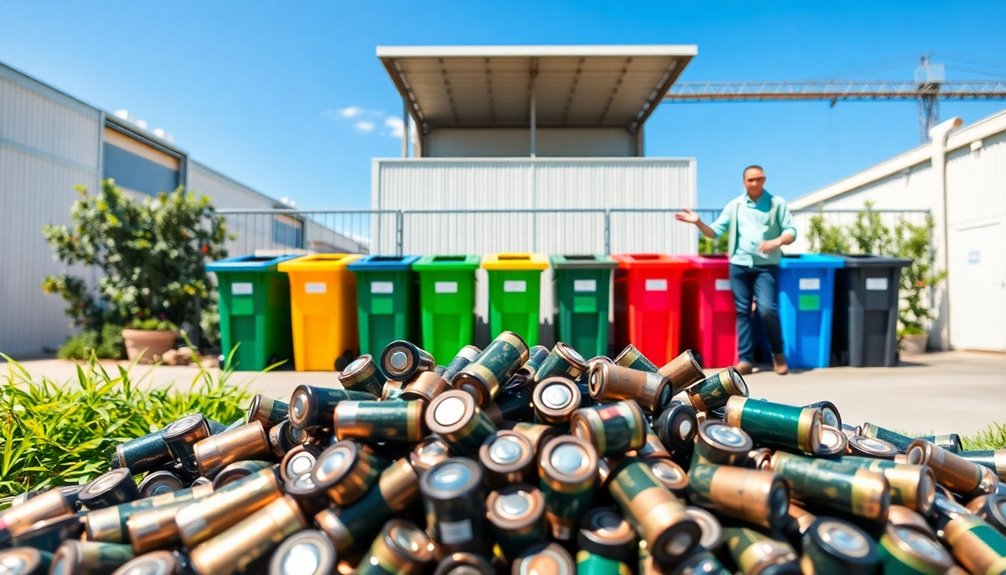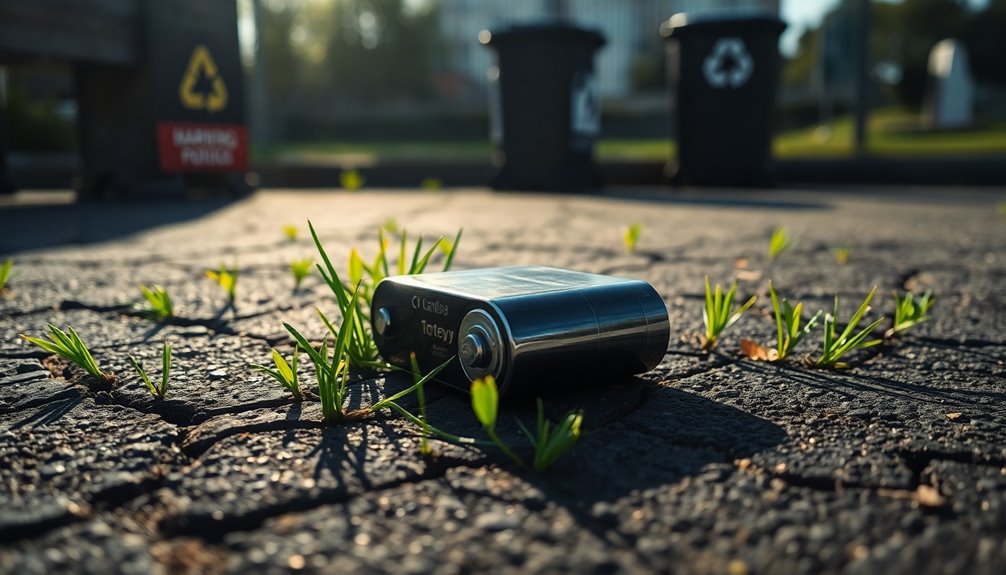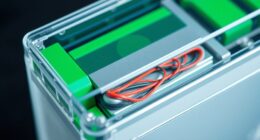If you're looking to dispose of lithium batteries safely, you've got several options nearby. Stores like Best Buy and Home Depot often have drop-off bins specifically for batteries. You can also check the Call2Recycle program to find local recycling centers. Additionally, keep an eye out for Household Hazardous Waste Collection Events in your area—they accept batteries too. Remember to wrap the terminals in tape and store them properly until you're ready to recycle. Want to find out more about the best practices and benefits of recycling lithium batteries? There's plenty more to explore!
Key Takeaways
- Check local retail stores like Best Buy and Home Depot for convenient battery drop-off locations.
- Use the Call2Recycle program to find nearby recycling centers in your area.
- Participate in local Household Hazardous Waste Collection Events for safe battery disposal.
- Explore Battery Recyclers of America for both small and large battery pickup services.
- Utilize online maps and guides to locate designated recycling bins in community centers.
Understanding Lithium Batteries
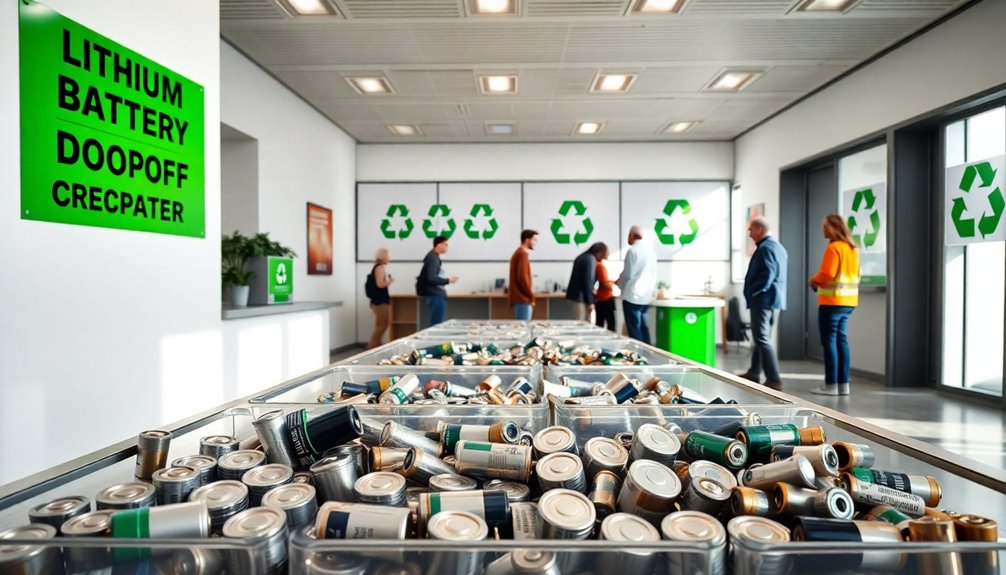
When you think about the devices you rely on daily, like smartphones and laptops, it's hard to ignore the role lithium batteries play in powering them.
These batteries contain valuable metals like lithium, cobalt, and nickel, making their recycling vital for resource recovery. Improper disposal can result in hazardous waste, leading to environmental contamination or even fires if damaged.
The recycling process for lithium batteries can recover 25% to 96% of materials, greatly reducing their environmental impact. However, handling them requires care to prevent hazards such as electrical shorts and chemical exposure.
That's why specialized recycling facilities are essential, using methods like mechanical processing and hydrometallurgical techniques to guarantee safe and efficient recycling of lithium batteries.
Importance of Recycling Lithium Batteries
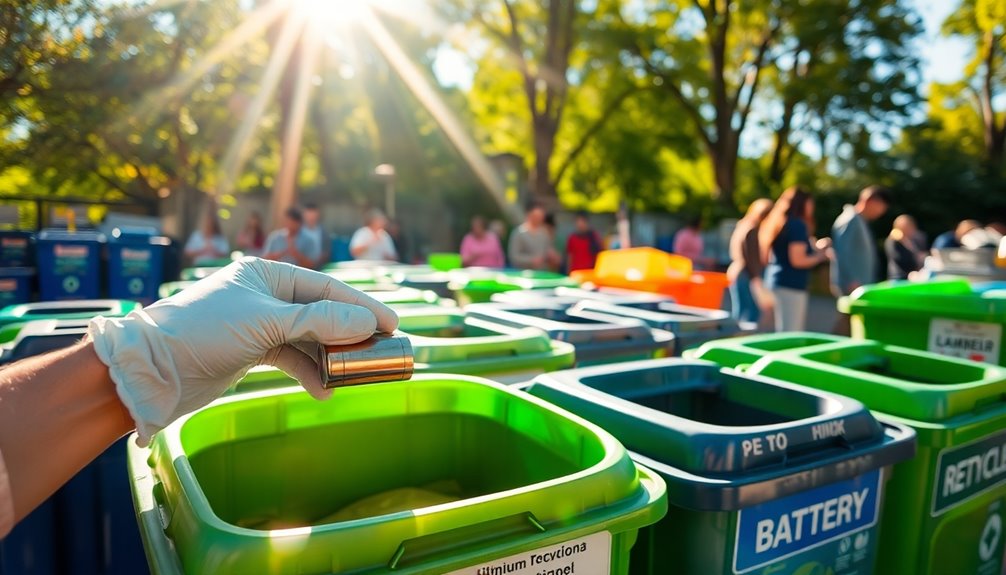
Recycling lithium batteries isn't just a smart choice; it's essential for protecting our environment.
By recovering valuable materials, you help reduce the need for mining and minimize waste.
Plus, proper recycling prevents hazardous chemicals from contaminating our soil and water, keeping our planet healthier.
Environmental Impact Mitigation
Though many people overlook it, recycling lithium batteries plays an essential role in mitigating environmental impact. By choosing to recycle, you help prevent hazardous materials like lithium and cobalt from contaminating soil and water supplies.
Here are some key benefits of recycling lithium batteries:
- Reduces pollution risks by keeping hazardous materials out of the environment.
- Recovers up to 96% of valuable materials, minimizing the need for new raw materials.
- Prevents fires and chemical leaks, addressing serious health and environmental hazards.
- Supports a circular economy by ensuring valuable materials are reused, promoting sustainable practices.
Resource Recovery Benefits
The importance of recycling lithium batteries goes beyond environmental protection; it also delivers significant resource recovery benefits. When you recycle lithium-ion batteries, you can recover 25% to 96% of valuable materials like lithium, cobalt, and nickel, reducing the need for virgin resource extraction.
This process helps prevent hazardous materials from contaminating soil and water supplies, thereby mitigating environmental pollution. By working with recycling companies, you contribute to initiatives that lower the carbon footprint of battery production, supporting sustainability efforts.
Each recycled battery saves enough energy to power a home for a day, highlighting the energy conservation benefits. With global lithium demand projected to rise by 500% by 2050, recycling is essential for future resource needs and promoting a circular economy.
Local Recycling Centers
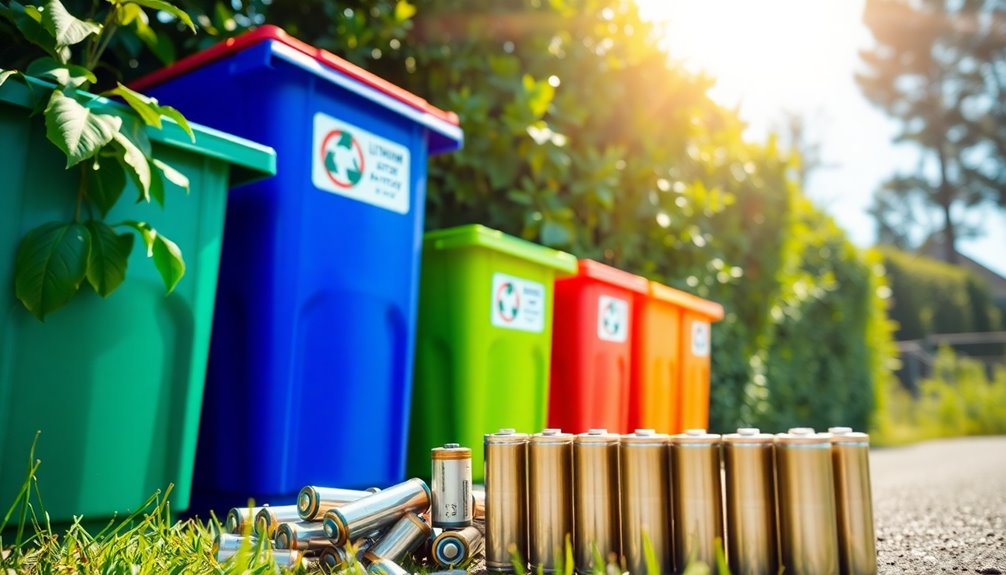
Finding a local recycling center for your lithium batteries is easier than you might think.
Many stores, like Best Buy and Home Depot, have drop-off locations, and you can use Call2Recycle's online tool to locate the nearest options.
Just be sure to check their guidelines to guarantee you're recycling correctly.
Find Nearby Locations
Where can you take your used lithium batteries for recycling? Fortunately, there are several convenient options near you to recycle batteries responsibly.
Here are some locations to evaluate:
- Retail Stores: Check stores like Best Buy and Lowe's that have drop-off bins for rechargeable batteries.
- Battery Recyclers: In Houston, Battery Recyclers of America provides services for both small and large pickups.
- Call2Recycle Locator: Use the Call2Recycle program's website to find a recycling center location near you.
- Hazardous Waste Events: Look for local Household Hazardous Waste Collection Events where you can safely dispose of batteries.
Recycling Center Guidelines
While many local recycling centers accept lithium batteries, it's important to familiarize yourself with their specific guidelines to guarantee proper disposal.
Some recycling centers may only accept certain types, like lithium-ion or lithium polymer batteries, so check local regulations before you go. Often, you'll need to tape the terminals to prevent short-circuiting, a common requirement for safe handling.
Municipal waste facilities, electronics retailers, and designated recycling events are usually the best drop-off spots. Programs like Call2Recycle also provide helpful network locations, encouraging eco-friendly practices within your community.
Researching local recycling options guarantees you know where to turn in your lithium batteries, avoiding potential environmental harm and contributing positively to sustainable disposal efforts.
How to Prepare Batteries for Recycling
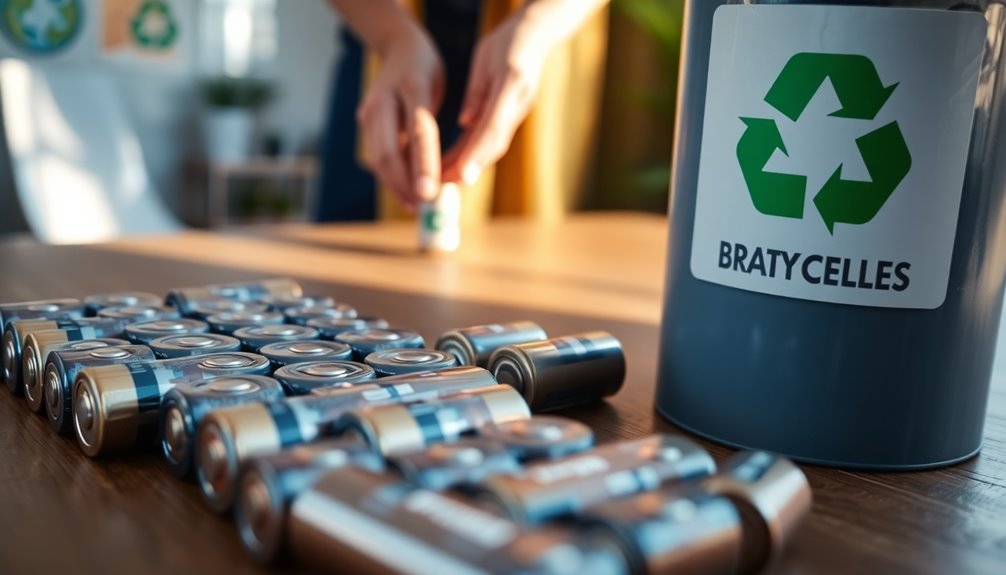
Preparing lithium batteries for recycling is essential to guarantee safety and compliance with local regulations. Follow these steps to properly prepare your used batteries, including rechargeable batteries and lithium-ion types, for recycling:
- Wrap terminals in tape: This prevents short circuits and potential fires during transport.
- Store in a cool, dry place: Keeping batteries in ideal conditions helps maintain their safety until you can recycle them.
- Use a plastic bag or container: Avoid metal containers that could cause short circuits when transporting your batteries to the recycling facility.
- Check local guidelines: Some areas may have specific preparation steps, like requiring batteries to be individually bagged. Always verify the instructions from your local recycling center.
Safe Disposal Practices
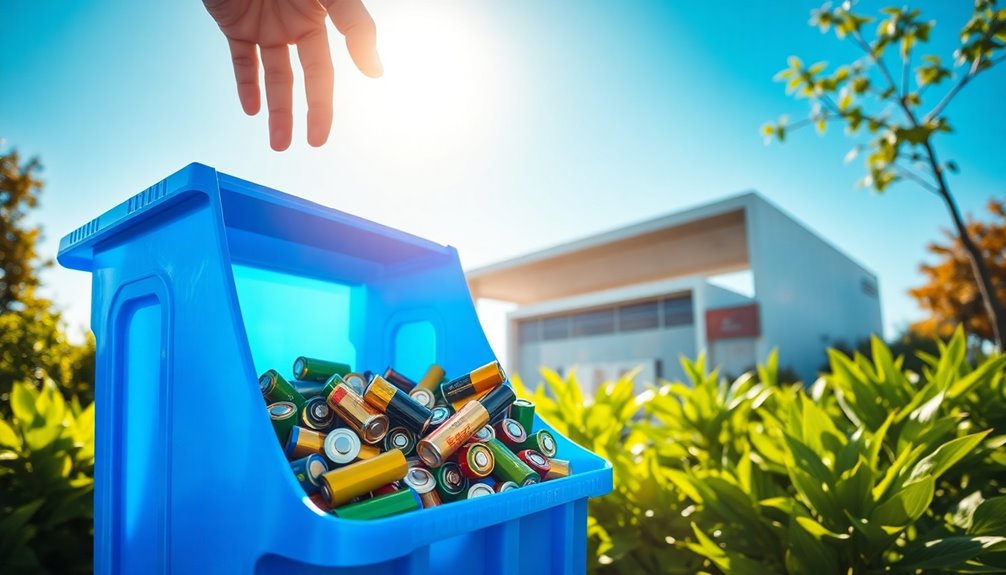
To guarantee safety and compliance when disposing of lithium batteries, you should always follow proper practices. Start by wrapping your batteries in plastic and taping the terminals to prevent short-circuiting. This step is vital for safe disposal.
Always utilize designated recycling centers or battery drop-off locations, as they guarantee the correct handling and processing of lithium batteries. Remember, federal laws mandate recycling due to the hazardous materials contained in these batteries, and failing to comply can lead to fines.
Many retailers, like Best Buy and Home Depot, offer convenient battery recycling programs. Additionally, consider participating in local Household Hazardous Waste Collection Events to safely drop off lithium batteries and other hazardous materials for proper recycling.
Environmental Impact of Improper Disposal
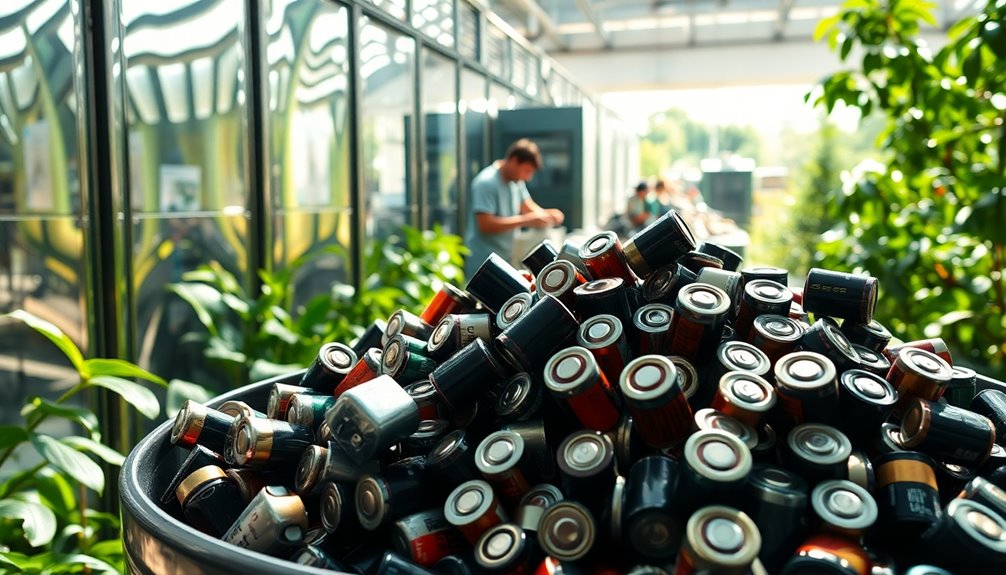
Improper disposal of lithium batteries poses serious environmental risks that can't be ignored. When you discard these batteries carelessly, toxic chemicals like lithium, cobalt, and nickel can leak into the soil and water, creating significant environmental impact.
Additionally, improperly discarded batteries can become fire hazards in landfills, leading to dangerous explosions.
Here are four reasons to recycle lithium batteries:
- Toxic Chemicals: Prevent harmful leaks into ecosystems.
- Heavy Metals: Reduce contamination risks to wildlife.
- Environmental Impact: Mitigate the growing electronic waste problem.
- Recycling: Recover up to 96% of valuable materials to lessen raw material demand.
Community Recycling Initiatives
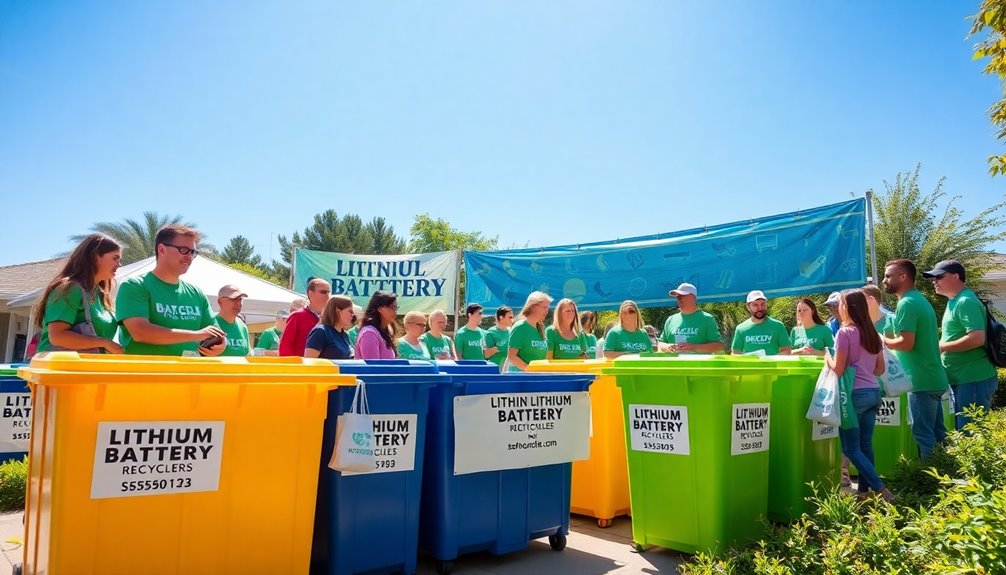
As communities recognize the importance of responsible lithium battery disposal, many are stepping up with innovative recycling initiatives. Local municipalities are partnering with organizations to create battery recycling programs that educate residents and offer convenient collection points. Events like Household Hazardous Waste Collection Days encourage participation and proper disposal.
| Benefits of Community Initiatives | Impact on Recycling Rates |
|---|---|
| Increased awareness of battery disposal | Significant rise in recycling rates |
| Convenient drop-off locations | Enhanced community involvement |
| Educational programs | Safer disposal practices |
| Collaboration with local businesses | Strengthened community ties |
These efforts, such as those from the Rechargeable Battery Recycling Corporation, play an essential role in keeping our environment safe while ensuring lithium batteries are recycled properly.
Frequently Asked Questions
Who Takes Lithium Batteries for Recycling?
If you're wondering who takes lithium batteries for recycling, you've got plenty of options.
Many retailers, like Best Buy and Lowe's, accept them at designated drop-off spots. You can also find collection sites run by the Rechargeable Battery Recycling Corporation (RBRC) through Call2Recycle.
Local recycling centers and household hazardous waste facilities often take them, ensuring safe disposal.
Plus, some municipalities hold community collection events for electronic waste, including lithium batteries.
Does Home Depot Accept Lithium Batteries for Recycling?
Yes, Home Depot does accept lithium batteries for recycling at most of its locations.
When you visit, look for the recycling bins near the entrance or customer service area. It's a great way to dispose of your rechargeable batteries responsibly.
Just remember to check with your local store first, as acceptance can vary based on location and battery type.
How Do You Dispose of Lithium-Ion Batteries and Recycle?
To dispose of lithium-ion batteries properly, you should never throw them in the trash.
Instead, find a local recycling center or participating retailer that accepts them, like Best Buy or Home Depot.
Before dropping them off, store the batteries in a cool, dry place and verify the terminals aren't damaged.
This way, you're helping the environment and recovering valuable materials.
Does Lowe's Recycle Lithium Batteries Near Me?
Yes, Lowe's does recycle lithium batteries at many of their locations.
You can drop off your lithium-ion batteries, including those from power tools and electronics, in designated recycling bins near the customer service desk.
To make sure your local Lowe's participates in this program, check their website's store locator or give them a call.
Conclusion
By choosing to properly dispose of lithium batteries, you're not just protecting your planet—you're paving the path for a cleaner, greener future. Every small step you take in recycling makes a significant impact, promoting sustainability and safety. So, seek out those local recycling centers and share this essential information with friends and family. Together, we can turn the tide against toxic waste and champion a healthier environment for generations to come!

